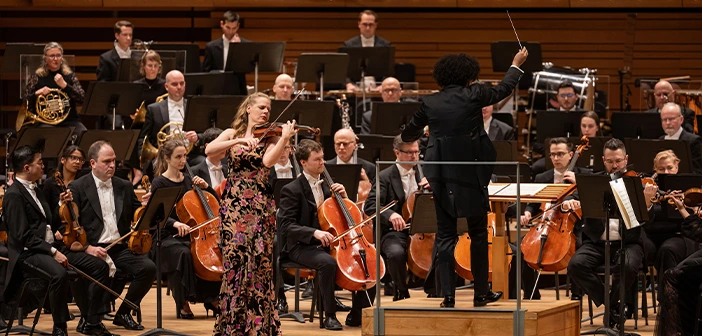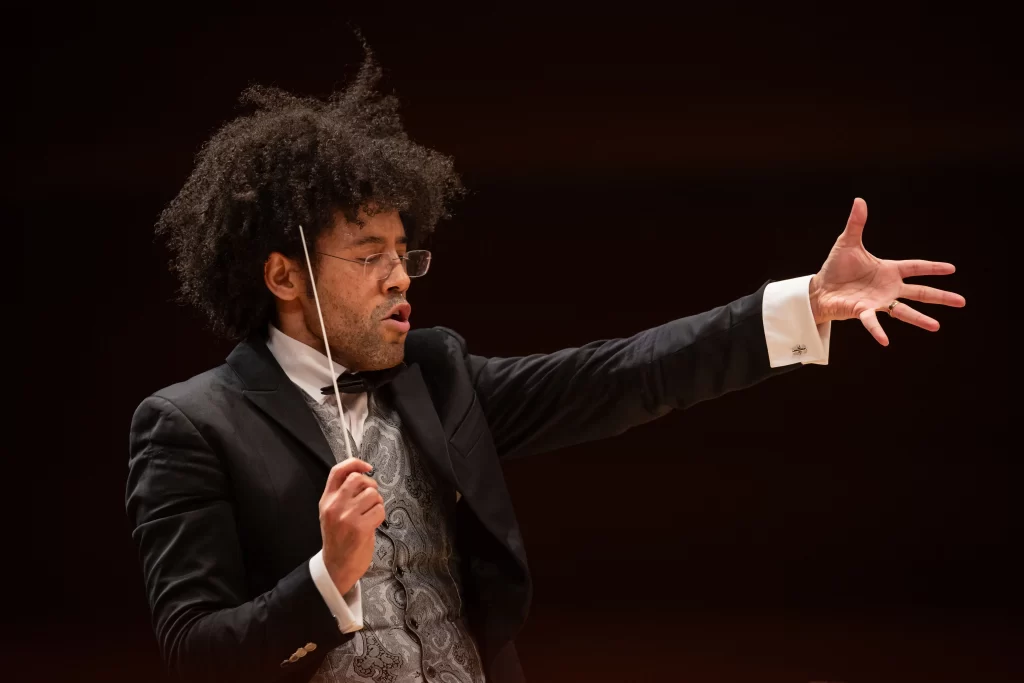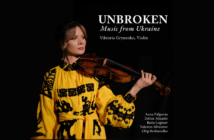This page is also available in / Cette page est également disponible en:
![]() Francais (French)
Francais (French)
On Tuesday, January 16, 2024, the Montreal Symphony Orchestra (MSO) delivered a sumptuous performance of Karol Szymanowsky’s Violin Concerto n.1 op.35 and Gustav Mahler’s Symphony n7 in E minor. A packed Maison symphonique welcomed the beloved Montreal institution as its general director Madeleine Careau delivered a speech reminding the public of the orchestra’s 90th anniversary history.
The program, presented twice, featured works emphasizing the orchestra’s colouristic potential and timbre variety. As per the detailed program notes, Szymanowsky’s Violin Concerto is one of the earliest modern examples of the genre. Written in 1916, when the composer was 34 years old, it breaks many 19th-century conventions in terms of its musical language, form, and flow.
Completed in the summer of 1908, Mahler’s Seventh Symphony comprises two previously composed inner movements with the same title (Nachtmusik) and three novel movements written in the span of four weeks. Formally contrasting from his first six symphonies, its instrumentation is similar to Das Lied von der Erde and his Tenth Symphony, notable for the use of the guitar and mandolin.
What you missed
From the very first notes of Szymanowsky’s violin concerto, Dutch soloist Simone Lamsma asserted her commanding and absorbing stage presence. Her expressive playing captured the stylistically complex writing of the Polish master.
Szymanowsky’s signature style, a natural blend of impressionism and expressionism, was perfectly rendered by the orchestra, led by maestro Rafael Payare. Hints of Ravel, Debussy, Gershwin, and Rachmaninov—for those less familiar with Szymanowsky’s musical language—surfaced throughout the highly depictive score. Audience members could relate to Szymanowsky’s rich tonal palette and melodic creativity by imagining at times playful, other times more dramatic narratives.
Szymanowsky brings a deep emotional current to his writing, delivered passionately and unflinchingly by Lamsma, even in its’ technically most demanding moments. Maestro Payare acted as the perfect facilitator, guiding the players in some tricky transitional moments. A treat.
The pièce de résistance of the evening was undoubtedly Mahler’s Seventh Symphony. In short: the MSO in rare form. Fully living up to the responsibility that was entrusted upon him, Payare found the orchestra’s sound, soul, capacity for chamber music playing, and vigour in a way that I have not witnessed in many years. In sharp contrast to Kent Nagano’s darker and more mellow sound, as well as his Germanic, analytical approach to the repertoire, Payare’s vitality gave the orchestra a new life.
Minus some imperceptible hiccups, the brass sounded crystalline, clear, agile, powerful when needed, and subtle when blending. Wonderful solos in the woodwind sections fondled our ears, flexible, nuanced, and inspired. The orchestra played with an energy that emerged from each section, as music flowed through the conductor’s own imagination and back to them. Payare’s style is unique: a mixture of ballet, subtle pantomime, and precise classical technique, he (re)opened the orchestra’s soul and sensitivity to color.
Some small gripes
In a symphony lasting over an hour, Payare and his orchestra kept us on the edge of our seats for the greater part of the work. However, audience concentration started to wane in the fourth movement, Nachtmusik. This was the result of the eclectic and distracted writing style more than the interpretation. Payare conveyed emotion to his orchestra in a way that was reminiscent of Mahler’s own conducting, based on what images we have of him: an intense facial expression, highly varied body postures, and very flexible, smooth gestures.
Overall impressions
Thanks in no small part to a young, talented, and vigorous conductor, and a younger generation of players working with more experienced members, the MSO presented the perfect fusion of vitality and subtlety. The audience responded with an enthusiastic standing ovation. An exceptional evening.
The Szymanowski and Mahler programs run January 16th, 17th and 20th at the Maison Symphonique. Montreal Symphony Orchestra conducted by Rafael Payare, featuring Simone Lamsma as the violin soloist.
https://www.osm.ca/en/concerts/rafael-payare-conducts-mahlers-symphony-no-7/
This page is also available in / Cette page est également disponible en:
![]() Francais (French)
Francais (French)















